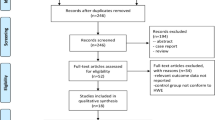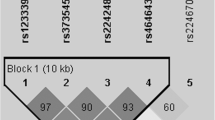Abstract
Cytochrome P450 2C19 (CYP2C19) plays an important role in the metabolism of xenobiotics and drugs and contributes to the catabolism of endogenous substrates like estradiol. Genetic variability impacts expression and activity of CYP2C19 and therefore can influence catabolism of estrogens. In the present study we analyzed the association of three polymorphisms of CYP2C19 namely CYP2C19*2 (CYP2C19_681_G>A, rs4244285), CYP2C19*3 (CYP2C19_636_G>A, rs57081121) and CYP2C19*17 (CYP2C19_-806_C>T, rs12248560), with breast cancer susceptibility. We genotyped 1,015 breast cancer cases and 1,021 age-matched, population-based controls of the German GENICA study by matrix assisted laser desorption/ionization time-of-flight mass spectrometry. Risk estimates were calculated by logistic regression. All tests were two-sided. We observed a decreased breast cancer risk for carriers of the CYP2C19*17 allele (OR 0.77, 95% CI: 0.65–0.93; P = 0.005). In subgroup analysis we observed a significant decreased breast cancer risk for women using hormone therapy for ten years or longer who were carriers of the CYP2C19*17 allele (OR 0.57, 95% CI: 0.39–0.83; P = 0.003). Since CYP2C19*17 defines an ultra rapid metabolizer phenotype we suggest that an increased catabolism of estrogens by CYP2C19 may lead to decreased estrogen levels and therefore reduces breast cancer risk. This protective effect seems to be stronger in combination with long-term intake of supplemental estrogens during hormone therapy.
Similar content being viewed by others
References
Key TJ, Allen NE, Spencer EA, Travis RC (2002) The effect of diet on risk of cancer. Lancet 360:861–868. doi:10.1016/S0140-6736(02)09958-0
Folkerd EJ, Martin LA, Kendall A, Dowsett M (2006) The relationship between factors affecting endogenous oestradiol levels in postmenopausal women and breast cancer. J Steroid Biochem Mol Biol 102:250–255. doi:10.1016/j.jsbmb.2006.09.024
Justenhoven C, Hamann U, Schubert F, Zapatka M, Pierl CB, Rabstein S et al (2008) Breast cancer: a candidate gene approach across the estrogen metabolic pathway. Breast Cancer Res Treat 108:137–149
Cheng ZN, Shu Y, Liu ZQ, Wang LS, Ou-Yang DS, Zhou HH (2001) Role of cytochrome P450 in estradiol metabolism in vitro. Acta Pharmacol Sin 22:148–154
Cribb AE, Knight MJ, Dryer D, Guernsey J, Hender K, Tesch M et al (2006) Role of polymorphic human cytochrome P450 enzymes in estrone oxidation. Cancer Epidemiol Biomarkers Prev 15:551–558. doi:10.1158/1055-9965.EPI-05-0801
Furuta T, Ohashi K, Kamata T, Takashima M, Kosuge K, Kawasaki T et al (1998) Effect of genetic differences in omeprazole metabolism on cure rates for Helicobacter pylori infection and peptic ulcer. Ann Intern Med 129:1027–1030
Furuta T, Shirai N, Watanabe F, Honda S, Takeuchi K, Iida T et al (2002) Effect of cytochrome P4502C19 genotypic differences on cure rates for gastroesophageal reflux disease by lansoprazole. Clin Pharmacol Ther 72:453–460. doi:10.1067/mcp.2002.127637
Furuta T, Shirai N, Sugimoto M, Ohashi K, Ishizaki T (2004) Pharmacogenomics of proton pump inhibitors. Pharmacogenomics 5:181–202. doi:10.1517/phgs.5.2.181.27483
Kawamura M, Ohara S, Koike T, Iijima K, Suzuki J, Kayaba S et al (2003) The effects of lansoprazole on erosive reflux oesophagitis are influenced by CYP2C19 polymorphism. Aliment Pharmacol Ther 17:965–973. doi:10.1046/j.1365-2036.2003.01539.x
Kirchheiner J, Nickchen K, Bauer M, Wong ML, Licinio J, Roots I et al (2004) Pharmacogenetics of antidepressants and antipsychotics: the contribution of allelic variations to the phenotype of drug response. Mol Psychiatry 9:442–473. doi:10.1038/sj.mp.4001494
Schroth W, Antoniadou L, Fritz P, Schwab M, Muerdter T, Zanger UM et al (2007) Breast cancer treatment outcome with adjuvant tamoxifen relative to patient CYP2D6 and CYP2C19 genotypes. J Clin Oncol 25:5187–5193. doi:10.1200/JCO.2007.12.2705
De Morais SM, Goldstein JA, Xie HG, Huang SL, Lu YQ, Xia H et al (1995) Genetic analysis of the S-mephenytoin polymorphism in a Chinese population. Clin Pharmacol Ther 58:404–411. doi:10.1016/0009-9236(95)90053-5
Wedlund PJ (2000) The CYP2C19 enzyme polymorphism. Pharmacology 61:174–183. doi:10.1159/000028398
De Morais SM, Wilkinson GR, Blaisdell J, Meyer UA, Nakamura K, Goldstein JA (1994) Identification of a new genetic defect responsible for the polymorphism of (S)-mephenytoin metabolism in Japanese. Mol Pharmacol 46:594–598
Roddam PL, Rollinson S, Kane E, Roman E, Moorman A, Cartwright R et al (2000) Poor metabolizers at the cytochrome P450 2D6 and 2C19 loci are at increased risk of developing adult acute leukaemia. Pharmacogenetics 10:605–615. doi:10.1097/00008571-200010000-00004
Sim SC, Risinger C, Dahl ML, Aklillu E, Christensen M, Bertilsson L et al (2006) A common novel CYP2C19 gene variant causes ultrarapid drug metabolism relevant for the drug response to proton pump inhibitors and antidepressants. Clin Pharmacol Ther 79:103–113. doi:10.1016/j.clpt.2005.10.002
Justenhoven C, Hamann U, Pesch B, Harth V, Rabstein S, Baisch C et al (2004) ERCC2 genotypes and a corresponding haplotype are linked with breast cancer risk in a German population. Cancer Epidemiol Biomarkers Prev 13:2059–2064
Justenhoven C, Pierl CB, Haas S, Fischer HP, Baisch C, Hamann U et al (2007) The CYP1B1_1358_GG genotype is associated with estrogen receptor-negative breast cancer. Breast Cancer Res Treat. doi:10.1007/s10549-007-9762-x
Pesch B, Ko Y, Brauch H, Hamann U, Harth V, Rabstein S et al (2005) Factors modifying the association between hormone-replacement therapy and breast cancer risk. Eur J Epidemiol 20:699–711. doi:10.1007/s10654-005-0032-0
Barrett JC, Fry B, Maller J, Daly MJ (2005) Haploview: analysis and visualization of LD and haplotype maps. Bioinformatics 21:263–265. doi:10.1093/bioinformatics/bth457
Kurzawski M, Gawronska-Szklarz B, Wrzesniewska J, Siuda A, Starzynska T, Drozdzik M (2006) Effect of CYP2C19*17 gene variant on Helicobacter pylori eradication in peptic ulcer patients. Eur J Clin Pharmacol 62:877–880. doi:10.1007/s00228-006-0183-2
Beral V (2003) Breast cancer and hormone-replacement therapy in the million women study. Lancet 362:419–427. doi:10.1016/S0140-6736(03)14596-5
Rossouw JE, Anderson GL, Prentice RL, LaCroix AZ, Kooperberg C, Stefanick ML et al Writing Group for the Women’s Health Initiative Investigators (2002) Risks and benefits of estrogen plus progestin in healthy postmenopausal women: principal results from the women’s health initiative randomized controlled trial. JAMA 288:321–333. doi:10.1001/jama.288.3.321
Acknowledgements
We are indebted to all women participating in the GENICA study. We gratefully acknowledge support by interviewers as well as physicians and pathologists of the study region. This work was supported by the Federal Ministry of Education and Research (BMBF) Germany grants 01KW9975/5, 01KW9976/8, 01KW9977/0 and 01KW0114, the Robert Bosch Foundation of Medical Research, Stuttgart, Department of Internal Medicine, Evangelische Kliniken Bonn gGmbH, Johanniter Krankenhaus, Bonn, Institute of Pathology, Medical Faculty of the University of Bonn, Deutsches Krebsforschungszentrum, Heidelberg, and Forschungsinstitut für Arbeitsmedizin der Deutschen Gesetzlichen Unfallversicherung, Bochum, Germany.
Author information
Authors and Affiliations
Corresponding author
Rights and permissions
About this article
Cite this article
Justenhoven, C., Hamann, U., Pierl, C.B. et al. CYP2C19*17 is associated with decreased breast cancer risk. Breast Cancer Res Treat 115, 391–396 (2009). https://doi.org/10.1007/s10549-008-0076-4
Received:
Accepted:
Published:
Issue Date:
DOI: https://doi.org/10.1007/s10549-008-0076-4




